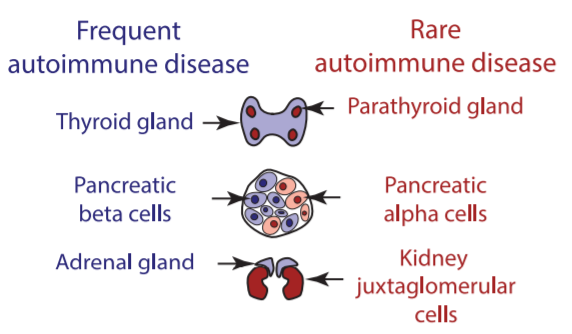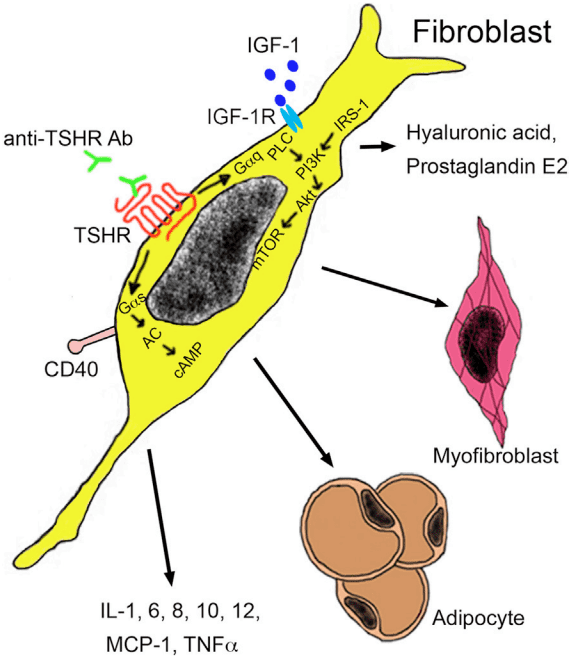Support
Autoantibodies can usually be detected long before their associated clinical diseases appear; this feature allows for disease prediction and specific clinical diagnosis and might aid disease prevention. Creative Biolabs is one of the largest natural autoantibodies (NAA) services and products suppliers, we have expertise and capabilities in providing high-quality NAA solutions. Our expertise shines through our services.
Description of Endocrine Diseases
The endocrine system is a network of organs whose main functions include the production and secretion of hormones. The endocrine system has been implicated in a variety of autoimmune diseases, with varying effects and severity depending on the organ involved. Autoimmune thyroid disorders and type 1 diabetes mellitus are the most common autoimmune endocrine disorders, while hypophysitis, adrenalitis, POF, and hypoparathyroidism represent quite rare conditions. Endocrine diseases can be primary in nature as those affecting the pituitary and thyroid glands, or secondary as those the result of systemic inflammation, chronic disease, abnormal mineral metabolism, organ dysfunction, or poor management (obesity).
 Fig.1 Some endocrine tissues are prone to autoimmune diseases, while others are not. (Kohanim, 2020)
Fig.1 Some endocrine tissues are prone to autoimmune diseases, while others are not. (Kohanim, 2020)
NAA and Type 1 Diabetes
Type 1 diabetes is a chronic autoimmune disease characterized by insulin deficiency and leads to hyperglycemia. Two forms are identified: type 1A results from a cell-mediated autoimmune attack on cells, whereas type 1B is far less frequent, has no known cause, and occurs mostly in individuals of Asian or African descent. Type 1 diabetes accounts for only 5-10% of all diabetes cases; however, its incidence continues to increase worldwide and has serious short - and long-term effects.
NAA and Thyroiditis
Thyroiditis is an inflammation of the thyroid gland that has several etiologies and can be associated with normal, elevated, or depressed thyroid function, often with the evolution from one condition to another. The most common forms are Hashimoto's disease, subacute granulomatous thyroiditis, postpartum thyroiditis, subacute lymphocytic thyroiditis, and drug-induced thyroiditis.
Role of Autoantibodies in the Pathogenesis of Endocrine Autoimmune Disorders
The role of autoantibodies in the pathogenesis of autoimmune disorders is still unclear. While certain autoantibodies have been proven to cause tissue damage, and others suspected to, many appear to have no harmful effect even though they are classically detected often in very high concentrations in the serum of patients with autoimmune disorders and thus are of diagnostic importance. Most harmful autoantibodies are of the destructive type, which leads to target cell death by causing lysis, while others, particularly those directed against endocrine cell surface hormone receptors, may have either a hormonal-like stimulating action or may block access of a trophic hormone, thereby causing major functional abnormalities.
 Fig.2 Autoantibodies in the pathogenesis of Graves’ orbitopathy.2
Fig.2 Autoantibodies in the pathogenesis of Graves’ orbitopathy.2
Autoantibodies are the serological hallmark of autoimmune disease. Creative Biolabs is diverse, knowledgeable, and agile, with a solid leadership universally recognized in the world of NAA. Delivering the best NAA services and products is just the start; we make sure each client gets our utmost attention and each project benefits from a customized service plan. If you are interested in our services and products, please contact us for more detail.
References
- Kohanim, Yael Korem, et al. "Endocrine autoimmune disease as a fragility of immune surveillance against hypersecreting mutants." Immunity 52.5 (2020): 872-884.
- Fröhlich, Eleonore, and Richard Wahl. "Thyroid autoimmunity: role of anti-thyroid antibodies in thyroid and extra-thyroidal diseases." Frontiers in immunology 8 (2017): 265506.
Related Services:
- NAA and Cancers
- NAA and Pulmonary Diseases
- NAA and Nephropathy
- NAA and Hematological Diseases
- NAA and Cardiovascular Diseases
- NAA and Neurological Diseases
- NAA and Infectious Diseases
- NAA and Autoimmune Disorders

